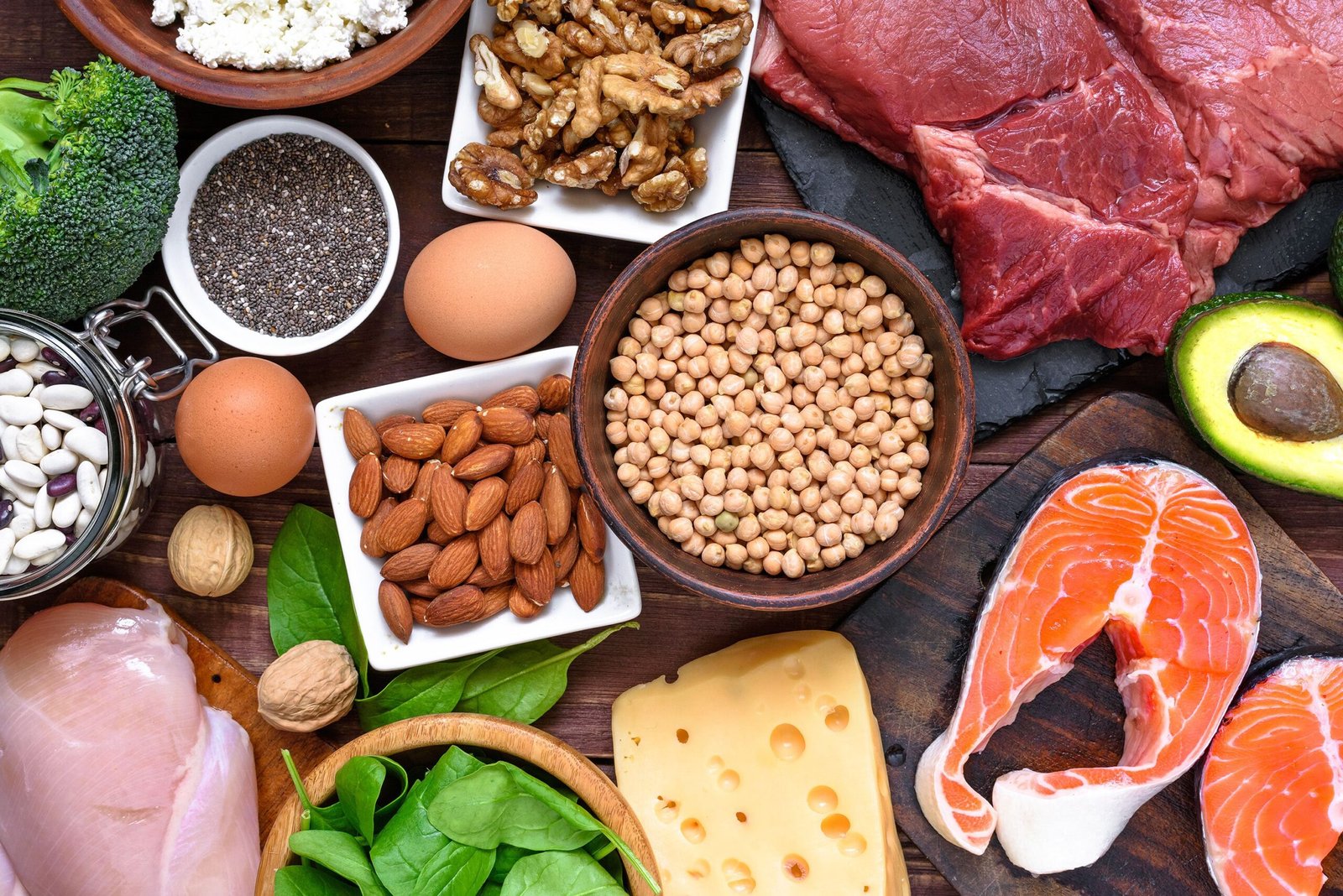As we age, maintaining a healthy and balanced diet becomes even more crucial for overall well-being. According to experts at Cleveland Clinic, older adults should focus on nutrient-dense foods like fruits, vegetables, whole grains, lean proteins, and healthy fats, which can provide the vitamins and minerals essential for longevity and health. For example, increasing intake of foods rich in fiber and vitamin D, like leafy greens and fatty fish, is recommended to support digestive health and strong bones.
Table of Contents
Our nutritional needs change due to shifts in metabolism, hormonal balance, and overall health. For women over 50, maintaining a balanced diet is crucial for promoting health, managing weight, and preventing chronic diseases. Here’s a comprehensive guide to essential nutritional needs for women over 50 to support optimal health and well-being.
Macronutrients
Protein
Importance: Protein is essential for preserving muscle mass, which tends to decrease with age. It also supports immune function, hormone production, and overall bodily maintenance.
Sources: Include lean meats, poultry, fish, eggs, dairy products, legumes, nuts, and seeds in your diet. Aim to incorporate a variety of protein sources to ensure you get a complete amino acid profile.
Recommended Intake: Aim for around 46 grams of protein per day, though individual needs may vary based on activity level and health conditions.
Carbohydrates
Importance: Carbohydrates are the body’s primary energy source. Choosing the right types of carbohydrates can help manage energy levels and support overall health.
Sources: Focus on complex carbohydrates like whole grains (brown rice, quinoa, oats), fruits, and vegetables. These provide fiber, which aids digestion and helps manage blood sugar levels.
Recommendations: Opt for low-glycemic index foods to avoid spikes in blood sugar levels, and include fiber-rich foods to support digestive health.

Fats
Importance: Healthy fats are vital for brain function, hormone production, and overall cell health. They also support heart health and help absorb fat-soluble vitamins.
Sources: Emphasize unsaturated fats from sources like avocados, nuts, seeds, and olive oil. Omega-3 fatty acids from fatty fish (such as salmon and sardines) are also beneficial for reducing inflammation and supporting cardiovascular health.
Recommendations: Limit intake of saturated and trans fats, which can contribute to heart disease. Aim to keep total fat intake balanced and focus on healthy fat sources.
Micronutrients
Calcium
Importance: Calcium is crucial for maintaining strong bones and preventing osteoporosis, especially important after menopause when bone density loss can accelerate.
Sources: Include dairy products (milk, yogurt, cheese), fortified plant-based milk alternatives, leafy green vegetables (such as kale and broccoli), and calcium-fortified foods.
Recommended Intake: Aim for about 1,200 milligrams per day. Consider a calcium supplement if dietary intake is insufficient, but consult with a healthcare provider first.
Vitamin D
Importance: Vitamin D aids in calcium absorption and bone health. It also plays a role in immune function and mood regulation.
Sources: Obtain vitamin D through sunlight exposure, fatty fish, fortified dairy products, and vitamin D supplements if necessary.
Recommended Intake: Aim for about 600 to 800 IU per day. Regular blood tests can help determine if supplementation is needed.
Vitamin B12
Importance: Vitamin B12 is vital for nerve function, red blood cell production, and DNA synthesis. Absorption may decrease with age, making it crucial for older adults.
Sources: Include animal products like meat, poultry, fish, dairy, and fortified cereals in your diet. Vitamin B12 supplements are available if dietary sources are insufficient.
Recommended Intake: Aim for about 2.4 micrograms per day. Consider supplements if absorption issues are suspected.

Folate
Importance: Folate supports cell division and repair and works closely with vitamin B12. Adequate folate intake can help reduce the risk of heart disease.
Sources: Incorporate leafy green vegetables, legumes, nuts, and fortified grains into your diet.
Recommended Intake: Aim for about 400 micrograms per day.
Iron
Importance: Iron is essential for oxygen transport and energy production. After menopause, women generally require less iron due to the cessation of menstruation.
Sources: Include lean meats, beans, lentils, fortified cereals, and dark leafy greens in your diet. Pair iron-rich foods with vitamin C sources to enhance absorption.
Recommended Intake: Aim for about 8 milligrams per day.
Hydration
Importance of Water
Importance: Proper hydration supports skin elasticity, digestion, and overall bodily functions. Dehydration can lead to various health issues, including kidney stones and decreased skin health.
Recommendations: Aim for at least 8 cups (64 ounces) of water per day, adjusting based on activity level and climate. Incorporate other hydrating fluids like herbal teas and low-sodium broths.
Tips: Avoid excessive caffeinated and alcoholic beverages, as they can contribute to dehydration. Monitor hydration levels by observing urine color and adjusting fluid intake accordingly.

Dietary Considerations
Managing Weight
Importance: Maintaining a healthy weight helps reduce the risk of chronic diseases such as diabetes, heart disease, and certain cancers.
Tips: Focus on portion control, balanced meals, and regular physical activity. Incorporate more fiber-rich foods and lean proteins to support weight management.
Heart Health
Importance: Heart disease risk increases with age, making a heart-healthy diet essential.
Tips: Limit saturated and trans fats, reduce sodium intake, and increase consumption of fruits, vegetables, and whole grains. Foods rich in antioxidants, such as berries and leafy greens, can help reduce inflammation.
Bone Health
Importance: Bone health is crucial for preventing fractures and maintaining mobility.
Tips: In addition to calcium and vitamin D, include foods rich in magnesium (nuts, seeds, whole grains) and vitamin K (leafy greens) to support bone health.
Special Dietary Needs
Managing Chronic Conditions
Importance: Chronic conditions like diabetes, hypertension, and high cholesterol require tailored dietary strategies.
Tips: Work with a healthcare provider or dietitian to develop a personalized eating plan that addresses specific health needs. Monitor and adjust your diet as needed to manage chronic conditions effectively.

Food Allergies and Sensitivities
Importance: Food allergies or sensitivities can impact nutritional intake and overall health.
Tips: If you have food allergies or sensitivities, avoid problematic foods and seek suitable alternatives. Consult with a healthcare provider or nutritionist to ensure nutritional adequacy.
Conclusion
For women over 50, addressing evolving nutritional needs is essential for maintaining optimal health and preventing chronic diseases. Prioritizing protein, healthy fats, complex carbohydrates, and essential vitamins and minerals can support overall well-being and vitality. Staying hydrated, managing weight, and tailoring the diet to individual health conditions further contribute to a healthier, more vibrant life. By making mindful food choices and seeking professional guidance when needed, women can enjoy a fulfilling and healthy lifestyle at any age.
Disclaimer: The content in this article is based on my personal experiences and is intended for informational purposes only. I am not a doctor or medical professional. Always consult with a healthcare provider before making any changes to your exercise routine or lifestyle, especially if you have any health concerns or conditions.
My mission is to celebrate the wisdom, resilience, and vitality of women as they navigate menopause, embrace life’s transitions, and step confidently into the next phase. Whether you’re exploring ways to stay fit, looking for health tips to prevent common issues, seeking inspiration for a fulfilling lifestyle, or simply wanting guidance on diet, I’ve got you covered.
Dive into our articles on fitness, health, lifestyle, nutrition and more to find the support and insights you need!





